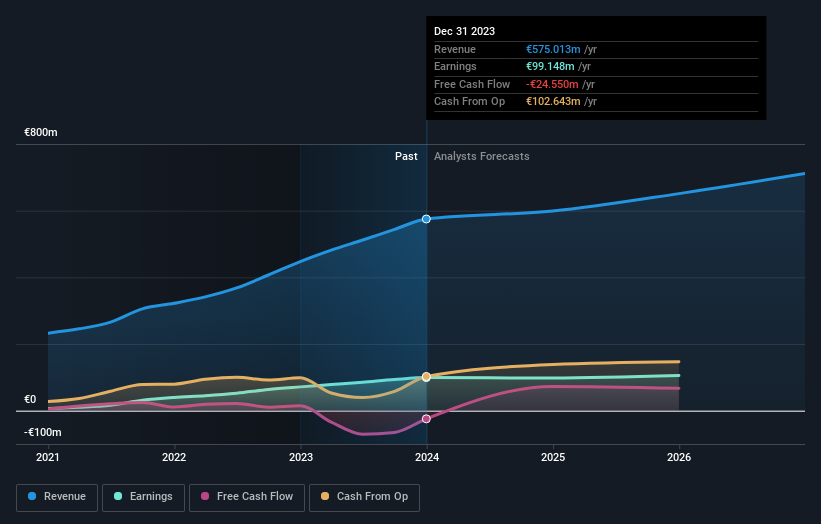Elmos Semiconductor SE's (ETR:ELG) market cap up €123m last week, benefiting both private companies who own 35% as well as insiders
Key Insights
The considerable ownership by private companies in Elmos Semiconductor indicates that they collectively have a greater say in management and business strategy
A total of 3 investors have a majority stake in the company with 58% ownership
If you want to know who really controls Elmos Semiconductor SE (ETR:ELG), then you'll have to look at the makeup of its share registry. The group holding the most number of shares in the company, around 35% to be precise, is private companies. Put another way, the group faces the maximum upside potential (or downside risk).
While private companies were the group that reaped the most benefits after last week’s 9.9% price gain, insiders also received a 24% cut.
In the chart below, we zoom in on the different ownership groups of Elmos Semiconductor.
See our latest analysis for Elmos Semiconductor
What Does The Institutional Ownership Tell Us About Elmos Semiconductor?
Institutional investors commonly compare their own returns to the returns of a commonly followed index. So they generally do consider buying larger companies that are included in the relevant benchmark index.
As you can see, institutional investors have a fair amount of stake in Elmos Semiconductor. This can indicate that the company has a certain degree of credibility in the investment community. However, it is best to be wary of relying on the supposed validation that comes with institutional investors. They too, get it wrong sometimes. When multiple institutions own a stock, there's always a risk that they are in a 'crowded trade'. When such a trade goes wrong, multiple parties may compete to sell stock fast. This risk is higher in a company without a history of growth. You can see Elmos Semiconductor's historic earnings and revenue below, but keep in mind there's always more to the story.
Elmos Semiconductor is not owned by hedge funds. Our data shows that Klaus Weyer is the largest shareholder with 23% of shares outstanding. For context, the second largest shareholder holds about 18% of the shares outstanding, followed by an ownership of 17% by the third-largest shareholder.
After doing some more digging, we found that the top 3 shareholders collectively control more than half of the company's shares, implying that they have considerable power to influence the company's decisions.
While it makes sense to study institutional ownership data for a company, it also makes sense to study analyst sentiments to know which way the wind is blowing. Quite a few analysts cover the stock, so you could look into forecast growth quite easily.
Insider Ownership Of Elmos Semiconductor
While the precise definition of an insider can be subjective, almost everyone considers board members to be insiders. Management ultimately answers to the board. However, it is not uncommon for managers to be executive board members, especially if they are a founder or the CEO.
Insider ownership is positive when it signals leadership are thinking like the true owners of the company. However, high insider ownership can also give immense power to a small group within the company. This can be negative in some circumstances.
It seems insiders own a significant proportion of Elmos Semiconductor SE. It is very interesting to see that insiders have a meaningful €331m stake in this €1.4b business. Most would say this shows a good degree of alignment with shareholders, especially in a company of this size. You can click here to see if those insiders have been buying or selling.
General Public Ownership
The general public-- including retail investors -- own 21% stake in the company, and hence can't easily be ignored. While this group can't necessarily call the shots, it can certainly have a real influence on how the company is run.
Private Company Ownership
We can see that Private Companies own 35%, of the shares on issue. It's hard to draw any conclusions from this fact alone, so its worth looking into who owns those private companies. Sometimes insiders or other related parties have an interest in shares in a public company through a separate private company.
Next Steps:
It's always worth thinking about the different groups who own shares in a company. But to understand Elmos Semiconductor better, we need to consider many other factors. Consider risks, for instance. Every company has them, and we've spotted 1 warning sign for Elmos Semiconductor you should know about.
Ultimately the future is most important. You can access this free report on analyst forecasts for the company.
NB: Figures in this article are calculated using data from the last twelve months, which refer to the 12-month period ending on the last date of the month the financial statement is dated. This may not be consistent with full year annual report figures.
Have feedback on this article? Concerned about the content? Get in touch with us directly. Alternatively, email editorial-team (at) simplywallst.com.
This article by Simply Wall St is general in nature. We provide commentary based on historical data and analyst forecasts only using an unbiased methodology and our articles are not intended to be financial advice. It does not constitute a recommendation to buy or sell any stock, and does not take account of your objectives, or your financial situation. We aim to bring you long-term focused analysis driven by fundamental data. Note that our analysis may not factor in the latest price-sensitive company announcements or qualitative material. Simply Wall St has no position in any stocks mentioned.

 Yahoo Finance
Yahoo Finance 

